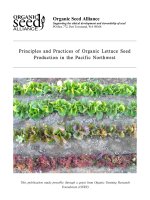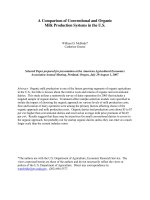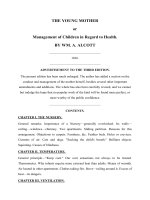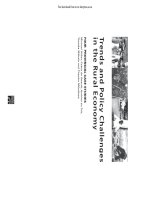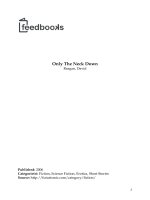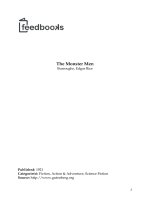The Brothers Karamazov pot
Bạn đang xem bản rút gọn của tài liệu. Xem và tải ngay bản đầy đủ của tài liệu tại đây (3.97 MB, 1,313 trang )
Download free eBooks of classic literature, books and
novels at Planet eBook. Subscribe to our free eBooks blog
and email newsletter.
The Brothers Karamazov
By Fyodor Dostoevsky
T B K
PART I
Book I
The History of a Family
F B P B.
Chapter 1
Fyodor Pavlovitch
Karamazov
A
LEXEY Fyodorovitch Karamazov was the third son of
Fyodor Pavlovitch Karamazov, a landowner well known
in our district in his own day, and still remembered among
us owing to his gloomy and tragic death, which happened
thirteen years ago, and which I shall describe in its proper
place. For the present I will only say that this ‘landowner’
— for so we used to call him, although he hardly spent a day
of his life on his own estate — was a strange type, yet one
pretty frequently to be met with, a type abject and vicious
and at the same time senseless. But he was one of those
senseless persons who are very well capable of looking aer
their worldly aairs, and, apparently, aer nothing else. Fy-
odor Pavlovitch, for instance, began with next to nothing;
his estate was of the smallest; he ran to dine at other men’s
tables, and fastened on them as a toady, yet at his death it
appeared that he had a hundred thousand roubles in hard
cash. At the same time, he was all his life one of the most
senseless, fantastical fellows in the whole district. I repeat, it
T B K
was not stupidity — the majority of these fantastical fellows
are shrewd and intelligent enough — but just senselessness,
and a peculiar national form of it.
He was married twice, and had three sons, the eldest,
Dmitri, by his rst wife, and two, Ivan and Alexey, by his
second. Fyodor Pavlovitch’s rst wife, Adelaida Ivanovna,
belonged to a fairly rich and distinguished noble family,
also landowners in our district, the Miusovs. How it came
to pass that an heiress, who was also a beauty, and more-
over one of those vigorous intelligent girls, so common in
this generation, but sometimes also to be found in the last,
could have married such a worthless, puny weakling, as we
all called him, I won’t attempt to explain. I knew a young
lady of the last ‘romantic’ generation who aer some years
of an enigmatic passion for a gentleman, whom she might
quite easily have married at any moment, invented insuper-
able obstacles to their union, and ended by throwing herself
one stormy night into a rather deep and rapid river from a
high bank, almost a precipice, and so perished, entirely to
satisfy her own caprice, and to be like Shakespeare’s Oph-
elia. Indeed, if this precipice, a chosen and favourite spot of
hers, had been less picturesque, if there had been a prosaic
at bank in its place, most likely the suicide would never
have taken place. is is a fact, and probably there have
been not a few similar instances in the last two or three
generations. Adelaida Ivanovna Miusov’s action was sim-
ilarly, no doubt, an echo of other people’s ideas, and was
due to the irritation caused by lack of mental freedom. She
wanted, perhaps, to show her feminine independence, to
F B P B.
override class distinctions and the despotism of her family.
And a pliable imagination persuaded her, we must suppose,
for a brief moment, that Fyodor Pavlovitch, in spite of his
parasitic position, was one of the bold and ironical spirits
of that progressive epoch, though he was, in fact, an ill-na-
tured buoon and nothing more. What gave the marriage
piquancy was that it was preceded by an elopement, and
this greatly captivated Adelaida Ivanovna’s fancy. Fyodor
Pavlovitch’s position at the time made him specially eager
for any such enterprise, for he was passionately anxious to
make a career in one way or another. To attach himself to a
good family and obtain a dowry was an alluring prospect.
As for mutual love it did not exist apparently, either in the
bride or in him, in spite of Adelaida Ivanovna’s beauty. is
was, perhaps, a unique case of the kind in the life of Fyodor
Pavlovitch, who was always of a voluptuous temper, and
ready to run aer any petticoat on the slightest encourage-
ment. She seems to have been the only woman who made
no particular appeal to his senses.
Immediatley aer the elopement Adelaida Ivanovna dis-
cerned in a ash that she had no feeling for her husband
but contempt. e marriage accordingly showed itself in
its true colours with extraordinary rapidity. Although the
family accepted the event pretty quickly and apportioned
the runaway bride her dowry, the husband and wife began
to lead a most disorderly life, and there were everlast-
ing scenes between them. It was said that the young wife
showed incomparably more generosity and dignity than
Fyodor Pavlovitch, who, as is now known, got hold of all
T B K
her money up to twenty ve thousand roubles as soon as
she received it, so that those thousands were lost to her for-
ever. e little village and the rather ne town house which
formed part of her dowry he did his utmost for a long time
to transfer to his name, by means of some deed of convey-
ance. He would probably have succeeded, merely from her
moral fatigue and desire to get rid of him, and from the
contempt and loathing he aroused by his persistent and
shameless importunity. But, fortunately, Adelaida Ivanov-
na’s family intervened and circumvented his greediness. It
is known for a fact that frequent ghts took place between
the husband and wife, but rumour had it that Fyodor Pav-
lovitch did not beat his wife but was beaten by her, for she
was a hot-tempered, bold, dark-browed, impatient woman,
possessed of remarkable physical strength. Finally, she le
the house and ran away from Fyodor Pavlovitch with a des-
titute divinity student, leaving Mitya, a child of three years
old, in her husband’s hands. Immediately Fyodor Pavlovitch
introduced a regular harem into the house, and abandoned
himself to orgies of drunkenness. In the intervals he used
to drive all over the province, complaining tearfully to each
and all of Adelaida Ivanovna’s having le him, going into
details too disgraceful for a husband to mention in regard
to his own married life. What seemed to gratify him and
atter his self-love most was to play the ridiculous part of
the injured husband, and to parade his woes with embel-
lishments.
‘One would think that you’d got a promotion, Fyodor
Pavlovitch, you seem so pleased in spite of your sorrow,’
F B P B.
scoers said to him. Many even added that he was glad of a
new comic part in which to play the buoon, and that it was
simply to make it funnier that he pretended to be unaware
of his ludicrous position. But, who knows, it may have been
simplicity. At last he succeeded in getting on the track of
his runaway wife. e poor woman turned out to be in Pe-
tersburg, where she had gone with her divinity student, and
where she had thrown herself into a life of complete eman-
cipation. Fyodor Pavlovitch at once began bustling about,
making preparations to go to Petersburg, with what object
he could not himself have said. He would perhaps have re-
ally gone; but having determined to do so he felt at once
entitled to fortify himself for the journey by another bout
of reckless drinking. And just at that time his wife’s family
received the news of her death in Petersburg. She had died
quite suddenly in a garret, according to one story, of typhus,
or as another version had it, of starvation. Fyodor Pavlov-
itch was drunk when he heard of his wife’s death, and the
story is that he ran out into the street and began shouting
with joy, raising his hands to Heaven: ‘Lord, now lettest
ou y servant depart in peace,’ but others say he wept
without restraint like a little child, so much so that people
were sorry for him, in spite of the repulsion he inspired. It
is quite possible that both versions were true, that he re-
joiced at his release, and at the same time wept for her who
released him. As a general rule, people, even the wicked,
are much more naive and simple-hearted than we suppose.
And we ourselves are, too.
T B K
Chapter 2
He Gets Rid of His
Eldest Son
Y
OU can easily imagine what a father such a man could be
and how he would bring up his children. His behaviour
as a father was exactly what might be expected. He com-
pletely abandoned the child of his marriage with Adelaida
Ivanovna, not from malice, nor because of his matrimonial
grievances, but simply because he forgot him. While he was
wearying everyone with his tears and complaints, and turn-
ing his house into a sink of debauchery, a faithful servant of
the family, Grigory, took the three-year old Mitya into his
care. If he hadn’t looked aer him there would have been no
one even to change the baby’s little shirt.
It happened moreover that the child’s relations on his
mother’s side forgot him too at rst. His grandfather was no
longer living, his widow, Mitya’s grandmother, had moved
to Moscow, and was seriously ill, while his daughters were
married, so that Mitya remained for almost a whole year
in old Grigory’s charge and lived with him in the servant’s
cottage. But if his father had remembered him (he could
F B P B.
not, indeed, have been altogether unaware of his existence)
he would have sent him back to the cottage, as the child
would only have been in the way of his debaucheries. But
a cousin of Mitya’s mother, Pyotr Alexandrovitch Miusov,
happened to return from Paris. He lived for many years af-
terwards abroad, but was at that time quite a young .man,
and distinguished among the Miusovs as a man of enlight-
ened ideas and of European culture, who had been in the
capitals and abroad. Towards the end of his life he became a
Liberal of the type common in the forties and ies. In the
course of his career he had come into contact with many
of the most Liberal men of his epoch, both in Russia and
abroad. He had known Proudhon and Bakunin personally,
and in his declining years was very fond of describing the
three days of the Paris Revolution of February, 1848, hint-
ing that he himself had almost taken part in the ghting on
the barricades. is was one of the most grateful recollec-
tions of his youth. He had an independent property of about
a thousand souls, to reckon in the old style. His splendid
estate lay on the outskirts of our little town and bordered
on the lands of our famous monastery, with which Pyotr
Alexandrovitch began an endless lawsuit, almost as soon as
he came into the estate, concerning the rights of shing in
the river or wood-cutting in the forest, I don’t know exactly
which. He regarded it as his duty as a citizen and a man
of culture to open an attack upon the ‘clericals.’ Hearing
all about Adelaida Ivanovna, whom he, of course, remem-
bered, and in whom he had at one time been interested, and
learning of the existence of Mitya, he intervened, in spite
T B K
of all his youthful indignation and contempt for Fyodor
Pavlovitch. He made the latter’s acquaintance for the rst
time, and told him directly that he wished to undertake
the child’s education. He used long aerwards to tell as a
characteristic touch, that when he began to speak of Mitya,
Fyodor Pavlovitch looked for some time as though he did
not understand what child he was talking about, and even
as though he was surprised to hear that he had a little son in
the house. e story may have been exaggerated, yet it must
have been something like the truth.
Fyodor Pavlovitch was all his life fond of acting, of sud-
denly playing an unexpected part, sometimes without any
motive for doing so, and even to his own direct disadvan-
tage, as, for instance, in the present case. is habit, however,
is characteristic of a very great number of people, some of
them very clever ones, not like Fyodor Pavlovitch. Pyotr Al-
exandrovitch carried the business through vigorously, and
was appointed, with Fyodor Pavlovitch, joint guardian of
the child, who had a small property, a house and land, le
him by his mother. Mitya did, in fact, pass into this cousin’s
keeping, but as the latter had no family of his own, and aer
securing the revenues of his estates was in haste to return
at once to Paris, he le the boy in charge of one of his cous-
ins, a lady living in Moscow. It came to pass that, settling
permanently in Paris he, too, forgot the child, especially
when the Revolution of February broke out, making an im-
pression on his mind that he remembered all the rest of his
life. e Moscow lady died, and Mitya passed into the care
of one of her married daughters. I believe he changed his
F B P B.
home a fourth time later on. I won’t enlarge upon that now,
as I shall have much to tell later of Fyodor Pavlovitch’s rst-
born, and must conne myself now to the most essential
facts about him, without which I could not begin my story.
In the rst place, this Mitya, or rather Dmitri Fyodoro-
vitch, was the only one of Fyodor Pavlovitch’s three sons
who grew up in the belief that he had property, and that he
would be independent on coming of age. He spent an irreg-
ular boyhood and youth. He did not nish his studies at the
gymnasium, he got into a military school, then went to the
Caucasus, was promoted, fought a duel, and was degraded
to the ranks, earned promotion again, led a wild life, and
spent a good deal of money. He did not begin to receive any
income from Fyodor Pavlovitch until he came of age, and
until then got into debt. He saw and knew his father, Fyodor
Pavlovitch, for the rst time on coming of age, when he vis-
ited our neighbourhood on purpose to settle with him about
his property. He seems not to have liked his father. He did
not stay long with him, and made haste to get away, having
only succeeded in obtaining a sum of money, and entering
into an agreement for future payments from the estate, of
the revenues and value of which he was unable (a fact wor-
thy of note), upon this occasion, to get a statement from his
father. Fyodor Pavlovitch remarked for the rst time then
(this, too, should be noted) that Mitya had a vague and ex-
aggerated idea of his property. Fyodor Pavlovitch was very
well satised with this, as it fell in with his own designs.
He gathered only that the young man was frivolous, un-
ruly, of violent passions, impatient, and dissipated, and that
T B K
if he could only obtain ready money he would be satised,
although only, of course, a short time. So Fyodor Pavlov-
itch began to take advantage of this fact, sending him from
time to time small doles, instalments. In the end, when four
years later, Mitya, losing patience, came a second time to
our little town to settle up once for all with his father, it
turned out to his amazement that he had nothing, that it
was dicult to get an account even, that he had received
the whole value of his property in sums of money from Fy-
odor Pavlovitch, and was perhaps even in debt to him, that
by various agreements into which he had, of his own desire,
entered at various previous dates, he had no right to expect
anything more, and so on, and so on. e young man was
overwhelmed, suspected deceit and cheating, and was al-
most beside himself. And, indeed, this circumstance led to
the catastrophe, the account of which forms the subject of
my rst introductory story, or rather the external side of it.
But before I pass to that story I must say a little of Fyodor
Pavlovitch’s other two sons, and of their origin.
F B P B.
Chapter 3
The Second Marriage
and the Second Family
V
ERY shortly aer getting his four-year-old Mitya o his
hands Fyodor Pavlovitch married a second time. His
second marriage lasted eight years. He took this second
wife, Sofya Ivanovna, also a very young girl, from another
province, where he had gone upon some small piece of busi-
ness in company with a Jew. ough Fyodor Pavlovitch was
a drunkard and a vicious debauchee he never neglected in-
vesting his capital, and managed his business aairs very
successfully, though, no doubt, not over-scrupulously. So-
fya Ivanovna was the daughter of an obscure deacon, and
was le from childhood an orphan without relations. She
grew up in the house of a general’s widow, a wealthy old
lady of good position, who was at once her benefactress and
tormentor. I do not know the details, but I have only heard
that the orphan girl, a meek and gentle creature, was once
cut down from a halter in which she was hanging from a
nail in the lo, so terrible were her suerings from the ca-
price and everlasting nagging of this old woman, who was
T B K
apparently not bad-hearted but had become an insuerable
tyrant through idleness.
Fyodor Pavlovitch made her an oer; inquiries were
made about him and he was refused. But again, as in his
rst marriage, he proposed an elopement to the orphan girl.
ere is very little doubt that she would not on any account
have married him if she had known a little more about him
in time. But she lived in another province; besides, what
could a little girl of sixteen know about it, except that she
would be better at the bottom of the river than remaining
with her benefactress. So the poor child exchanged a bene-
factress for a benefactor. Fyodor Pavlovitch did not get a
penny this time, for the general’s widow was furious. She
gave them nothing and cursed them both. But he had not
reckoned on a dowry; what allured him was the remarkable
beauty of the innocent girl, above all her innocent appear-
ance, which had a peculiar attraction for a vicious proigate,
who had hitherto admired only the coarser types of femi-
nine beauty.
‘ose innocent eyes slit my soul up like a razor,’ he used
to say aerwards, with his loathsome snigger. In a man so
depraved this might, of course, mean no more than sen-
sual attraction. As he had received no dowry with his wife,
and had, so to speak, taken her ‘from the halter,’ he did
not stand on ceremony with her. Making her feel that she
had ‘wronged’ him, he took advantage of her phenomenal
meekness and submissiveness to trample on the elemen-
tary decencies of marriage. He gathered loose women into
his house, and carried on orgies of debauchery in his wife’s
F B P B.
presence. To show what a pass things had come to, I may
mention that Grigory, the gloomy, stupid, obstinate, argu-
mentative servant, who had always hated his rst mistress,
Adelaida Ivanovna, took the side of his new mistress. He
championed her cause, abusing Fyodor Pavlovitch in a
manner little betting a servant, and on one occasion broke
up the revels and drove all the disorderly women out of
the house. In the end this unhappy young woman, kept in
terror from her childhood, fell into that kind of nervous
disease which is most frequently found in peasant women
who are said to be ‘possessed by devils.’ At times aer ter-
rible ts of hysterics she even lost her reason. Yet she bore
Fyodor Pavlovitch two sons, Ivan and Alexey, the eldest in
the rst year of marriage and the second three years lat-
er. When she died, little Alexey was in his fourth year, and,
strange as it seems, I know that he remembered his moth-
er all his life, like a dream, of course. At her death almost
exactly the same thing happened to the two little boys as
to their elder brother, Mitya. ey were completely forgot-
ten and abandoned by their father. ey were looked aer
by the same Grigory and lived in his cottage, where they
were found by the tyrannical old lady who had brought up
their mother. She was still alive, and had not, all those eight
years, forgotten the insult done her. All that time she was
obtaining exact information as to her Sofya’s manner of life,
and hearing of her illness and hideous surroundings she
declared aloud two or three times to her retainers:
‘It serves her right. God has punished her for her ingrati-
tude.’
T B K
Exactly three months aer Sofya Ivanovna’s death the
general’s widow suddenly appeared in our town, and went
straight to Fyodor Pavlovitch’s house. She spent only half
an hour in the town but she did a great deal. It was eve-
ning. Fyodor Pavlovitch, whom she had not seen for those
eight years, came in to her drunk. e story is that instantly
upon seeing him, without any sort of explanation, she gave
him two good, resounding slaps on the face, seized him by a
tu of hair, and shook him three times up and down. en,
without a word, she went straight to the cottage to the two
boys. Seeing, at the rst glance, that they were unwashed
and in dirty linen, she promptly gave Grigory, too, a box on
the ear, and announcing that she would carry o both the
children she wrapped them just as they were in a rug, put
them in the carriage, and drove o to her own town. Grigory
accepted the blow like a devoted slave, without a word, and
when he escorted the old lady to her carriage he made her a
low bow and pronounced impressively that, ‘God would re-
pay her for orphans.’ ‘You are a blockhead all the same,’ the
old lady shouted to him as she drove away.
Fyodor Pavlovitch, thinking it over, decided that it was a
good thing, and did not refuse the general’s widow his for-
mal consent to any proposition in regard to his children’s
education. As for the slaps she had given him, he drove all
over the town telling the story.
It happened that the old lady died soon aer this, but she
le the boys in her will a thousand roubles each ‘for their in-
struction, and so that all be spent on them exclusively, with
the condition that it be so portioned out as to last till they
F B P B.
are twenty-one, for it is more than adequate provision for
such children. If other people think t to throw away their
money, let them.’ I have not read the will myself, but I heard
there was something queer of the sort, very whimsically ex-
pressed. e principal heir, Yem Petrovitch Polenov, the
Marshal of Nobility of the province, turned out, however,
to be an honest man. Writing to Fyodor Pavlovitch, and
discerning at once that he could extract nothing from him
for his children’s education (though the latter never direct-
ly refused but only procrastinated as he always did in such
cases, and was, indeed, at times eusively sentimental), Ye-
m Petrovitch took a personal interest in the orphans. He
became especially fond of the younger, Alexey, who lived
for a long while as one of his family. I beg the reader to note
this from the beginning. And to Yem Petrovitch, a man of
a generosity and humanity rarely to be met with, the young
people were more indebted for their education and bring-
ing up than to anyone. He kept the two thousand roubles
le to them by the general’s widow intact, so that by the
time they came of age their portions had been doubled by
the accumulation of interest. He educated them both at his
own expense, and certainly spent far more than a thousand
roubles upon each of them. I won’t enter into a detailed ac-
count of their boyhood and youth, but will only mention a
few of the most important events. Of the elder, Ivan, I will
only say that he grew into a somewhat morose and reserved,
though far from timid boy. At ten years old he had realised
that they were living not in their own home but on other
people’s charity, and that their father was a man of whom
T B K
it was disgraceful to speak. is boy began very early, al-
most in his infancy (so they say at least), to show a brilliant
and unusual aptitude for learning. I don’t know precise-
ly why, but he le the family of Yem Petrovitch when he
was hardly thirteen, entering a Moscow gymnasium and
boarding with an experienced and celebrated teacher, an
old friend of Yem Petrovitch. Ivan used to declare aer-
wards that this was all due to the ‘ardour for good works’ of
Yem Petrovitch, who was captivated by the idea that the
boy’s genius should be trained by a teacher of genius. But
neither Yem Petrovitch nor this teacher was living when
the young man nished at the gymnasium and entered the
university. As Yem Petrovitch had made no provision for
the payment of the tyrannical old lady’s legacy, which had
grown from one thousand to two, it was delayed, owing to
formalities inevitable in Russia, and the young man was in
great straits for the rst two years at the university, as he
was forced to keep himself all the time he was studying. It
must be noted that he did not even attempt to communi-
cate with his father, perhaps from pride, from contempt for
him, or perhaps from his cool common sense, which told
him that from such a father he would get no real assistance.
However that may have been, the young man was by no
means despondent and succeeded in getting work, at rst
giving sixpenny lessons and aerwards getting paragraphs
on street incidents into the newspapers under the signature
of ‘Eye-Witness.’ ese paragraphs, it was said, were so in-
teresting and piquant that they were soon taken. is alone
showed the young man’s practical and intellectual superi-
F B P B.
ority over the masses of needy and unfortunate students of
both sexes who hang about the oces of the newspapers
and journals, unable to think of anything better than ev-
erlasting entreaties for copying and translations from the
French. Having once got into touch with the editors Ivan
Fyodorovitch always kept up his connection with them, and
in his latter years at the university he published brilliant
reviews of books upon various special subjects, so that he
became well known in literary circles. But only in his last
year he suddenly succeeded in attracting the attention of a
far wider circle of readers, so that a great many people no-
ticed and remembered him. It was rather a curious incident.
When he had just le the university and was preparing to go
abroad upon his two thousand roubles, Ivan Fyodorovitch
published in one of the more important journals a strange
article, which attracted general notice, on a subject of which
he might have been supposed to know nothing, as he was a
student of natural science. e article dealt with a subject
which was being debated everywhere at the time — the po-
sition of the ecclesiastical courts. Aer discussing several
opinions on the subject he went on to explain his own view.
What was most striking about the article was its tone, and
its unexpected conclusion. Many of the Church party re-
garded him unquestioningly as on their side. And yet not
only the secularists but even atheists joined them in their
applause. Finally some sagacious persons opined that the
article was nothing but an impudent satirical burlesque. I
mention this incident particularly because this article pen-
etrated into the famous monastery in our neighbourhood,
T B K
where the inmates, being particularly interested in question
of the ecclesiastical courts, were completely bewildered by
it. Learning the author’s name, they were interested in his
being a native of the town and the son of ‘that Fyodor Pav-
lovitch.’ And just then it was that the author himself made
his appearance among us.
Why Ivan Fyodorovitch had come amongst us I remem-
ber asking myself at the time with a certain uneasiness.
is fateful visit, which was the rst step leading to so many
consequences, I never fully explained to myself. It seemed
strange on the face of it that a young man so learned, so
proud, and apparently so cautious, should suddenly vis-
it such an infamous house and a father who had ignored
him all his life, hardly knew him, never thought of him, and
would not under any circumstances have given him money,
though he was always afraid that his sons Ivan and Alexey
would also come to ask him for it. And here the young man
was staying in the house of such a father, had been living
with him for two months, and they were on the best pos-
sible terms. is last fact was a special cause of wonder to
many others as well as to me. Pyotr Alexandrovitch Miusov,
of whom we have spoken already, the cousin of Fyodor Pav-
lovitch’s rst wife, happened to be in the neighbourhood
again on a visit to his estate. He had come from Paris, which
was his permanent home. I remember that he was more sur-
prised than anyone when he made the acquaintance of the
young man, who interested him extremely, and with whom
he sometimes argued and not without inner pang com-
pared himself in acquirements.
F B P B.
‘He is proud,’ he used to say, ‘he will never be in want of
pence; he has got money enough to go abroad now. What
does he want here? Everyone can see that he hasn’t come for
money, for his father would never give him any. He has no
taste for drink and dissipation, and yet his father can’t do
without him. ey get on so well together!’
at was the truth; the young man had an unmistakable
inuence over his father, who positively appeared to be be-
having more decently and even seemed at times ready to
obey his son, though oen extremely and even spitefully
perverse.
It was only later that we learned that Ivan had come part-
ly at the request of, and in the interests of, his elder brother,
Dmitri, whom he saw for the rst time on this very visit,
though he had before leaving Moscow been in correspon-
dence with him about an important matter of more concern
to Dmitri than himself. What that business was the reader
will learn fully in due time. Yet even when I did know of
this special circumstance I still felt Ivan Fyodorovitch to
be an enigmatic gure, and thought his visit rather mys-
terious.
I may add that Ivan appeared at the time in the light of
a mediator between his father and his elder brother Dmitri,
who was in open quarrel with his father and even planning
to bring an action against him.
e family, I repeat, was now united for the rst time,
and some of its members met for the rst time in their
lives. e younger brother, Alexey, had been a year already
among us, having been the rst of the three to arrive. It is
T B K
of that brother Alexey I nd it most dicult to speak in this
introduction. Yet I must give some preliminary account of
him, if only to explain one queer fact, which is that I have
to introduce my hero to the reader wearing the cassock of
a novice. Yes, he had been for the last year in our monas-
tery, and seemed willing to be cloistered there for the rest
of his life.
F B P B.
Chapter 4
The Third Son, Alyosha
H
E was only twenty, his brother Ivan was in his twen-
ty-fourth year at the time, while their elder brother
Dmitri was twenty-seven. First of all, I must explain that
this young man, Alyosha, was not a fanatic, and, in my
opinion at least, was not even a mystic. I may as well give
my full opinion from the beginning. He was simply an early
lover of humanity, and that he adopted the monastic life
was simply because at that time it struck him, so to say, as
the ideal escape for his soul struggling from the darkness
of worldly wickedness to the light of love. And the reason
this life struck him in this way was that he found in it at
that time, as he thought an extrordinary being, our cele-
brated elder, Zossima, to whom he became attached with all
the warm rst love of his ardent heart. But I do not dispute
that he was very strange even at that time, and had been so
indeed from his cradle. I have mentioned already, by the
way, that though he lost his mother in his fourth year he re-
membered her all his life her face, her caresses, ‘as though
she stood living before me.’ Such memories may persist, as
everyone knows, from an even earlier age, even from two
T B K
years old, but scarcely standing out through a whole life-
time like spots of light out of darkness, like a corner torn
out of a huge picture, which has all faded and disappeared
except that fragment. at is how it was with him. He re-
membered one still summer evening, an open window, the
slanting rays of the setting sun (that he recalled most vivid-
ly of all); in a corner of the room the holy image, before it a
lighted lamp, and on her knees before the image his mother,
sobbing hysterically with cries and moans, snatching him
up in both arms, squeezing him close till it hurt, and pray-
ing for him to the Mother of God, holding him out in both
arms to the image as though to put him under the Moth-
er’s protection and suddenly a nurse runs in and snatches
him from her in terror. at was the picture! And Alyosha
remembered his mother’s face at that minute. He used to
say that it was frenzied but beautiful as he remembered. But
he rarely cared to speak of this memory to anyone. In his
childhood and youth he was by no means expansive, and
talked little indeed, but not from shyness or a sullen un-
sociability; quite the contrary, from something dierent,
from a sort of inner preoccupation entirely personal and
unconcerned with other people, but so important to him
that he seemed, as it were, to forget others on account of it.
But he was fond of people: he seemed throughout his life
to put implicit trust in people: yet no one ever looked on
him as a simpleton or naive person. ere was something
about him which made one feel at once (and it was so all
his life aerwards) that he did not care to be a judge of oth-
ers that he would never take it upon himself to criticise and
F B P B.
would never condemn anyone for anything. He seemed,
indeed, to accept everything without the least condemna-
tion though oen grieving bitterly: and this was so much so
that no one could surprise or frighten him even in his ear-
liest youth. Coming at twenty to his father’s house, which
was a very sink of lthy debauchery, he, chaste and pure
as he was, simply withdrew in silence when to look on was
unbearable, but without the slightest sign of contempt or
condemnation. His father, who had once been in a depen-
dent position, and so was sensitive and ready to take oence,
met him at rst with distrust and sullenness. ‘He does not
say much,’ he used to say, ‘and thinks the more.’ But soon,
within a fortnight indeed, he took to embracing him and
kissing him terribly oen, with drunken tears, with sottish
sentimentality, yet he evidently felt a real and deep aec-
tion for him, such as he had never been capable of feeling
for anyone before.
Everyone, indeed, loved this young man wherever he
went, and it was so from his earliest childhood. When he
entered the household of his patron and benefactor, Yem
Petrovitch Polenov, he gained the hearts of all the family, so
that they looked on him quite as their own child. Yet he en-
tered the house at such a tender age that he could not have
acted from design nor artfulness in winning aection. So
that the gi of making himself loved directly and uncon-
sciously was inherent in him, in his very nature, so to speak.
It was the same at school, though he seemed to be just one
of those children who are distrusted, sometimes ridiculed,
and even disliked by their schoolfellows. He was dreamy, for

